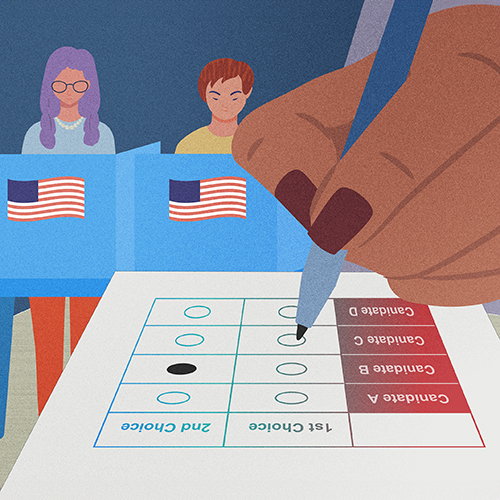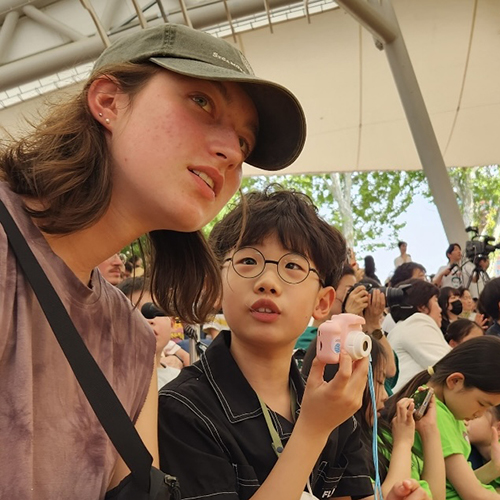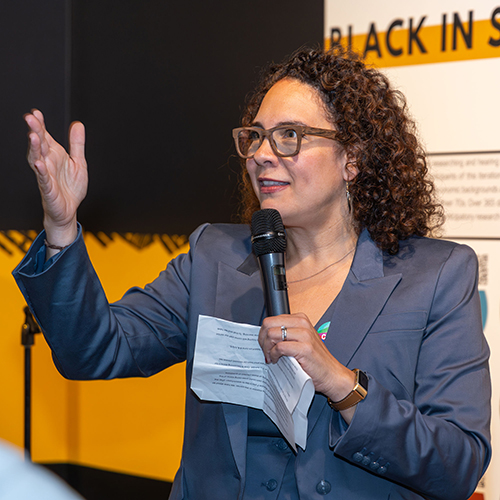High school teacher David Grosskopf knows his students will succeed in college. But sometimes the students don’t share his confidence—until they take a college-level course he teaches each spring.
Grosskopf created the course collaboratively with university faculty and high school teachers from around the region through Texts and Teachers, a UW program designed to bridge the gap between high school and college. The high school teachers and university faculty teach the course concurrently, with back-and-forth visits built into the curriculum. High school students attend one class session on campus with their college counterparts, and university faculty teach a session at each participating high school.
“Students in this class very much feel the connection to the University of Washington,” says Grosskopf, co-chair of the English Department at Roosevelt High School in Seattle. “When the content of assigned articles is dense or the content of literature emotionally brutal, students feel they’re engaging in conversations they don’t have in high school—certainly not as a matter of routine.”

Gary Handwerk, UW professor of English, launched the Texts and Teachers program in 1999 with a course on literature and the environment. Colleagues Anu Taranath, senior lecturer in the UW Department of English and Comparative History of Ideas Program, and Christine Chaney (BA, MA, PhD, English, 1982, 1992, 1998), professor of English at Seattle Pacific University, have since added courses on social justice and film. The three faculty collaborate with a total of 12 teachers at 8 area high schools.
Each course is designed by one faculty member and up to six high school teachers, with all participants having an equal voice. The process begins with a week-long workshop during the summer. “We introduce the teachers to the program in general and its philosophy, and then basically turn them loose to design their own course,” says Handwerk. “They do a lot of the work in that week—agreeing on core texts, talking about assignments.”
Our collaborations have sparked new approaches and ideas and recommitted me to old ones, and I love that.
Grosskopf was one of six high school teachers who joined UW Distinguished Teaching Award recipient Anu Taranath to develop “Margins and Centers: Who’s In, Who’s Out, and Why That Matters for Us All,” a course that explores social justice through literature. “Working with smart people on a curriculum of literature and social justice is so rich,” says Grosskopf. “Our work contexts vary widely, and our students have such diverse concerns. Our collaborations have sparked new approaches and ideas and recommitted me to old ones, and I love that.”
University faculty gain as much from the experience as their high school collaborators. Handwerk was particularly challenged by teaching to high school students. “It was terrifying at the beginning,” he admits. “There are ways in which I had to rethink my pedagogical objectives to get the high school students to the same level as my college students. I feel that teaching to a different audience has made me a better teacher in my University classes. It’s been an incredible learning experience.”

The high school students have nerves of their own as they anticipate the visit from university faculty. Many students are intimidated and afraid of saying the wrong thing. Those concerns quickly vanish once the professor dives into the course material. “The depth of the professor’s knowledge and the ready way she drew upon complex ideas was powerful for them,” recalls Grosskopf of Professor Taranath’s visit. “One student said this is exactly the kind of class she hoped to have over and over in the future.”
Those feelings are reinforced when the students attend class on campus, seated side-by-side with college students reading the same texts. “It’s been surprising how powerful it turns out to be,” says Handwerk. “The high school students discover that they can respond to questions and participate actively in a college-level course. For a lot of them, that’s eye-opening.”
For the Margin and Centers course, Taranath is planning an even more ambitious interaction across institutions: a full-day symposium for all of the high school and UW students taking the course. The event will feature mixed small-group discussions, presentations by a social justice group and UW colleagues, and more.

“Each of the four participating high schools works with such different populations of students,” explains Taranath. “Imagining these different categories of young people all reading and discussing the same pieces of literature at the same time seemed pretty momentous. We started to dream: what if we could facilitate some cross-talk between schools and students? What if students across the region could gather together, with the participation of UW students, and discuss how ‘margins and centers’ plays out in our lives, schools, and families, as well as in the literature we’ve read?”
Taranath will have her answer thanks to a generous gift from donor Jane LeCuyer to fund the symposium. Seed money for other Texts and Teachers projects, including course development workshops and books for high school classrooms, has come from private donors, UW in the High School, Simpson Center for the Humanities, and the UW English and Comparative Literature departments.
And those high school students who worry about their readiness for college? For most, attending a class on campus eases their minds. “They experience the electricity of a college seminar,” says Grosskopf, “and discover—most often with surprise—that they are totally up to the task.”
More Stories

Democracy by the Numbers
Mathematics and Democracy, an undergraduate mathematics course, explores the role of math in many aspects of democracy, from elections to proportional representation.

Finding Family in Korea Through Language & Plants
Through her love of languages and plants — and some serendipity — UW junior Katie Ruesink connected with a Korean family while studying in Seoul.

Interrupting Privilege Starts with Listening
Personal stories are integral to Interrupting Privilege, a UW program that leans into difficult intergenerational discussions about race and privilege.